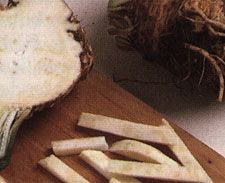
FoodFood InformationVegetablesRoot Vegetables
Celeriac is not one of our more popular vegetables, perhaps because it
resembles an unwashed horseradish root. Yet beneath its unattractive, unglamorous
shell lies a flavorful, crisp, cream-colored, smooth-textured flesh that
tastes like celery. It can be used raw in fresh salads or as a cooked vegetable
and it is an important ingredient in soups. While it is not much of a seller
in the United States, it is very popular in northern Europe. Here at home,
fresh celeriac is available every month but June and July.
When harvested, celeriac looks like coarse green celery attached to a rough-looking
bulbous root. In late summer and early fall it comes to market usually tied
in bunches that have three knobs and with the celery-like greens attached.
The greens are too coarse to use raw as table celery, but if they are fresh
and have not begun to yellow, they make a fine soup green. After the first
frost the celeriac is shipped to market minus the greens and sold as a root
vegetable by the pound.
Select firm medium-sized knobs; small ones have too much waste when peeled
and large knobs are apt to be hollow or woody. Pressure on any darker areas
of the skin will expose decay that otherwise might be hidden by the rough
exterior.
If stored in a cool, moist area, such as underground in root cellars or
in the refrigerator, the shelf life of celeriac can be measured in weeks
and even months. When served raw, the exposed flesh tends to discolor. This
discoloration can be retarded by adding a few drops of vinegar or lemon
juice. When cooking celeriac, they will be easier to peel after they have
been boiled.
Forty or fifty years ago, when we didn't have a wide array of fresh vegetables
during the winter and early spring months, celeriac was available in most
retail produce stores at very modest prices. Then it all but disappeared
from the produce counters until about ten years ago, when it started to
be featured in cookbooks and magazines. It is now making a slow comeback,
not as a staple but as a gourmet food, selling of course at gourmet prices.

Deamer 5/97